Your gut microbiome contains trillions of bacteria that control far more than just digestion. When these microscopic organisms fall out of balance, they can trigger problems throughout your entire body, from your skin to your brain.
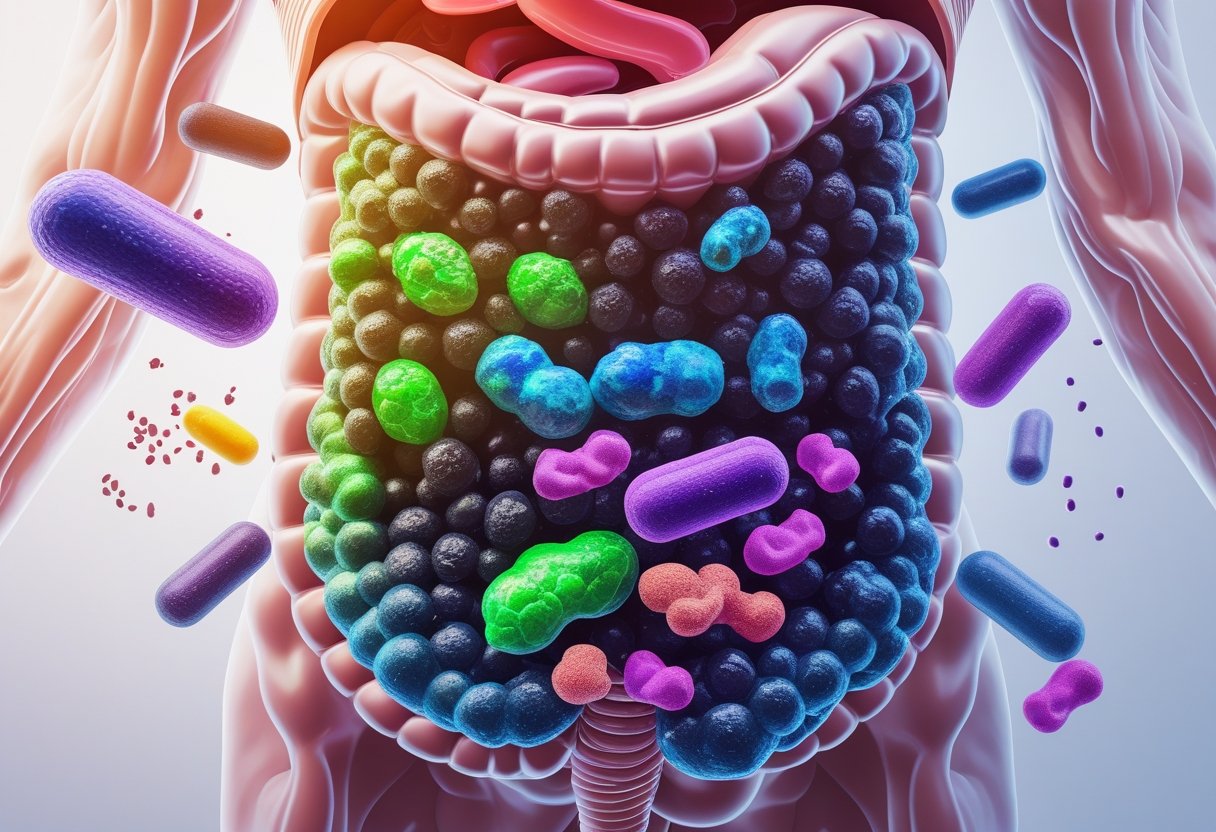
Common signs of an unhealthy gut include frequent bloating, unexplained fatigue, mood swings, skin breakouts, and getting sick often. Many people don’t realize that symptoms like constant sugar cravings and unpredictable mood changes[1] actually stem from gut bacteria imbalances rather than willpower or stress alone.
The good news is that resetting your gut microbiome doesn’t have to be overwhelming[2]. Simple changes like eating probiotic foods, cutting back on processed sugar, and managing stress can restore balance and improve how you feel every day.
Key Takeaways
- Gut bacteria imbalances cause symptoms throughout the body including digestive issues, fatigue, skin problems, and frequent illness
- An unhealthy gut affects weight management, immune function, and mental health through complex biological connections
- Eating probiotic foods, reducing processed foods, and managing stress can restore gut health naturally within weeks
Understanding the Gut Microbiome
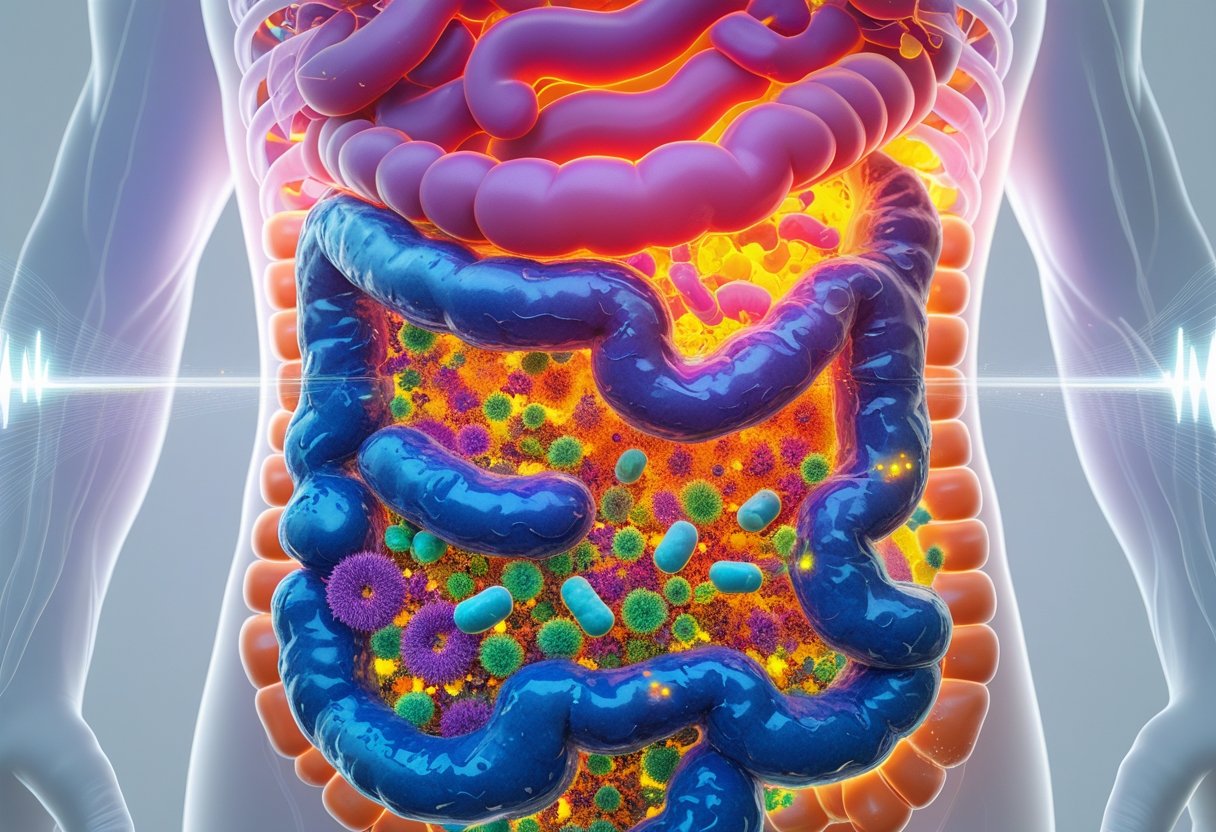
Your gut microbiome contains trillions of bacteria that directly impact your health. The balance between good bacteria and harmful microbes determines how well your digestive system functions and affects your immune system, mood, and overall wellbeing.
What Is the Gut Microbiome?
The gut microbiome refers to trillions of bacteria and other microorganisms[3] that live in your digestive tract. These microscopic organisms create a complex ecosystem inside your intestines.
Your digestive system houses over 1,000 different species of bacteria. Each person’s microbiome is unique, like a fingerprint.
The microbiome weighs about 2-3 pounds in adults. Most of these microbes live in your large intestine, where they help break down food and produce important nutrients.
Key microbiome components include:
- Bacteria (the largest group)
- Viruses
- Fungi
- Other single-celled organisms
Your gut bacteria begin forming at birth. They continue changing throughout your life based on diet, medications, stress, and environment.
The diversity of your gut microbiome matters more than the total number of bacteria. People with more diverse bacterial species tend to have better health outcomes.
Role of Good and Bad Bacteria
A healthy microbiome has the right balance of good bacteria, which help keep the bad bacteria in check[3]. Good bacteria support digestion and protect against harmful invaders.
Beneficial bacteria functions:
- Break down fiber into short-chain fatty acids
- Produce vitamins B and K
- Support immune system development
- Create protective barriers against pathogens
Bad bacteria can cause problems when they multiply too much. They may produce toxins or trigger inflammation in your digestive tract.
When the gut contains too many harmful bacteria and not enough helpful bacteria, it’s called dysbiosis[3]. This imbalance leads to various health issues.
The ratio should favor good bacteria by about 85% to 15%. Factors like antibiotics, processed foods, and chronic stress can disrupt this balance.
Why Gut Health Matters Beyond Digestion
Your gut microbiome connects to nearly every system in your body. The bacteria in your digestive tract communicate with your brain, immune system, and other organs through chemical signals.
About 95% of serotonin production happens in your gut. This brain chemical controls mood and sleep patterns, explaining why gut problems often link to mental health issues.
Your gut microbes help teach your immune cells how to recognize foreign invaders[3]. They also influence how your body activates different parts of your immune system.
Gut health impacts:
- Blood sugar regulation
- Inflammation levels throughout the body
- Heart health and cholesterol
- Weight management
- Skin conditions like eczema
An imbalanced gut microbiome can cause inflammation in the intestine and throughout the rest of the body[3]. This chronic inflammation contributes to many diseases including diabetes, heart disease, and autoimmune disorders.
Key Signs Your Gut Microbiome Is Unhealthy
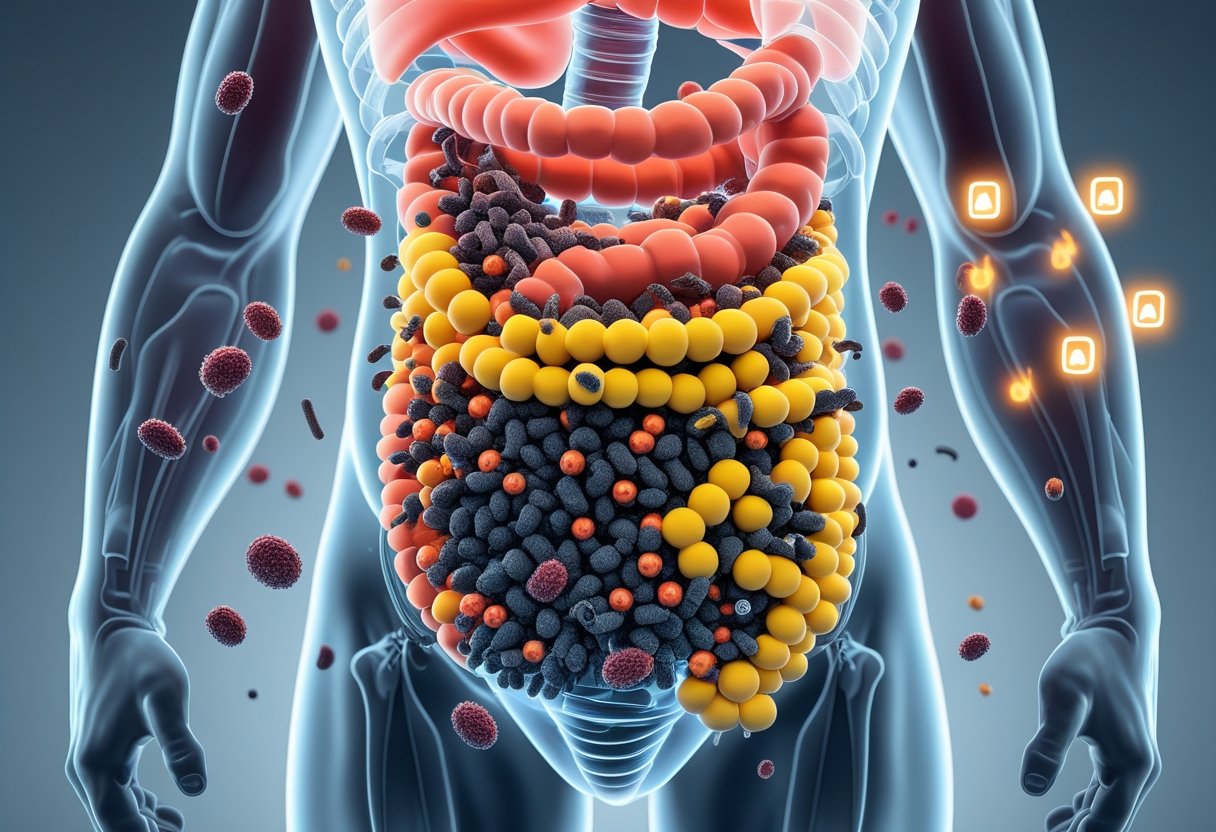
An unhealthy gut creates noticeable physical symptoms that affect daily comfort and digestive function. The most common warning signs include persistent digestive discomfort, irregular bathroom habits, and frequent acid-related stomach problems.
Digestive Symptoms: Bloating, Gas, and Discomfort
Bloating and gas are among the most common signs of an unhealthy gut[3]. When gut bacteria become unbalanced, they struggle to break down food properly.
This leads to fermentation in the intestines. The process creates excess gas that causes uncomfortable bloating and frequent flatulence.
Common digestive symptoms include:
- Persistent abdominal pain or cramping
- Feeling full even after small meals
- Uncomfortable gas buildup
- Stomach distension after eating
People with digestive issues often experience these symptoms within 30 minutes to 2 hours after meals. The discomfort can range from mild to severe.
Poor digestion may also cause upset stomach and general abdominal discomfort. These digestive symptoms[4] often worsen with certain foods like dairy, gluten, or high-fiber vegetables.
Irregular Bowel Habits: Constipation and Diarrhea
Healthy gut bacteria help regulate bowel movements and maintain digestive balance. When the microbiome becomes unhealthy, it disrupts normal bathroom patterns.
Constipation occurs when beneficial bacteria decrease and harmful bacteria increase. This imbalance slows down digestion and makes bowel movements difficult or infrequent.
Signs of constipation include:
- Fewer than 3 bowel movements per week
- Hard, dry, or lumpy stools
- Straining during bathroom visits
- Feeling of incomplete evacuation
Diarrhea happens when bad bacteria overgrow and irritate the intestinal lining. This creates loose, watery stools that occur more than 3 times per day.
Some people experience alternating constipation and diarrhea. This pattern often indicates conditions like IBS, which connects directly to gut microbiome imbalances[5].
Frequent Heartburn or Acid Reflux
Acid reflux occurs when stomach acid flows back into the esophagus. An unhealthy gut microbiome can worsen this condition by affecting digestion speed and stomach acid production.
When gut bacteria are unbalanced, food sits longer in the stomach. This increases pressure and makes acid more likely to escape upward.
Heartburn symptoms include:
- Burning sensation in the chest
- Sour taste in the mouth
- Difficulty swallowing
- Chest pain after eating
People with poor digestive health[6] often experience heartburn 2-3 times per week or more. The symptoms typically worsen after large meals or when lying down.
Chronic acid reflux can damage the esophagus over time. It may also indicate that the gut microbiome needs attention and rebalancing through dietary changes.
Widespread Effects of an Unhealthy Gut
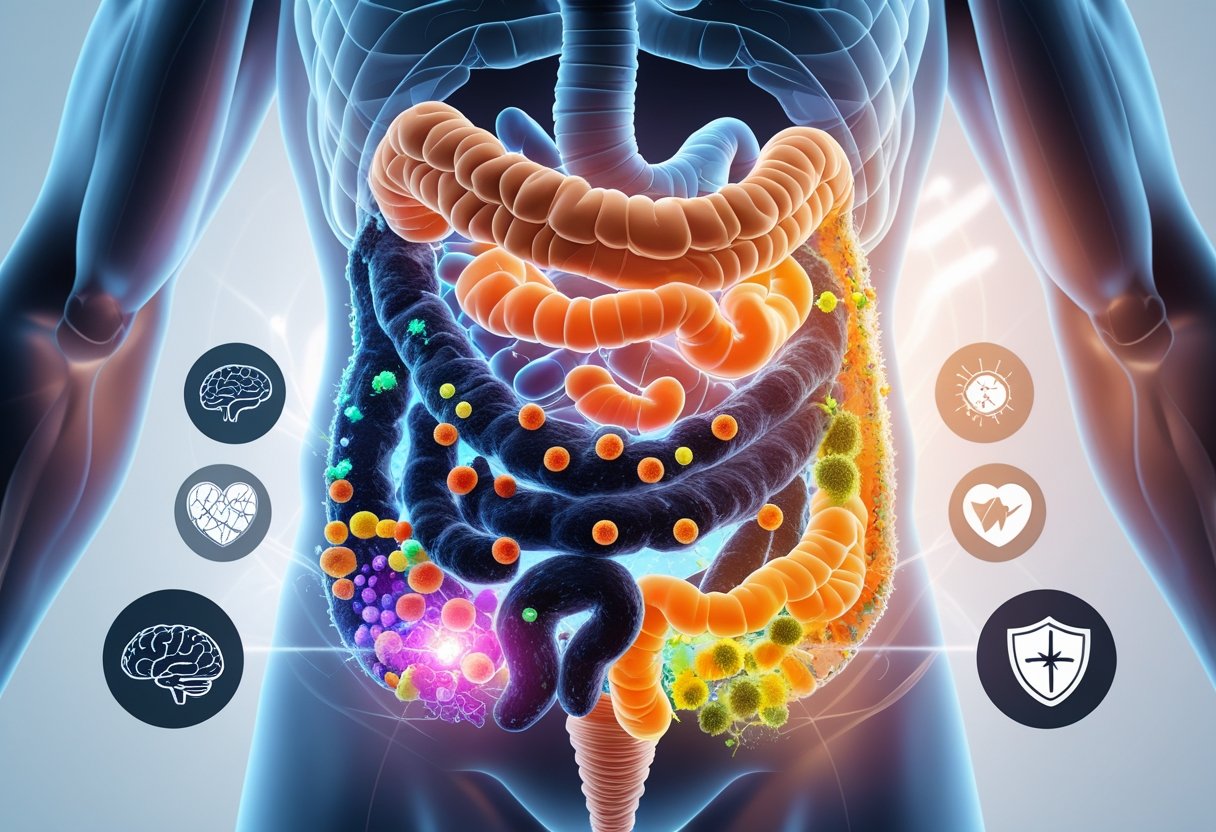
Poor gut health extends far beyond digestive symptoms, triggering skin flare-ups like eczema and acne, causing unexpected weight fluctuations, and disrupting sleep patterns that leave people feeling constantly tired.
Skin Problems: Acne, Eczema, and Rosacea
An imbalanced gut microbiome directly affects skin health through the gut-skin connection. When harmful bacteria outnumber beneficial ones, inflammation spreads throughout the body and reaches the skin.
Skin issues like eczema, psoriasis, and rosacea[3] often develop when the immune system reacts to imbalanced bacteria. This reaction triggers inflammatory responses that manifest as red, irritated patches on the skin.
Acne breakouts frequently worsen with gut dysbiosis. The inflammation from poor gut health increases oil production and clogs pores more easily.
People with healthy gut bacteria typically experience:
- Clearer, less reactive skin
- Fewer inflammatory breakouts
- Better healing of existing skin conditions
- Reduced redness and irritation
Eczema flare-ups become more frequent and severe when gut bacteria are out of balance. The compromised intestinal barrier allows toxins to enter the bloodstream, triggering immune responses that appear as itchy, inflamed skin patches.
Unexpected Weight Changes
Gut microbiome imbalances cause surprising weight fluctuations that seem unrelated to diet or exercise changes. An imbalanced gut microbiome can cause the body to struggle to absorb nutrients, regulate blood sugar, and store fat[3].
Weight gain occurs when harmful bacteria interfere with metabolism and hormone production. These bacteria can increase inflammation and insulin resistance, making the body store more fat.
Common weight-related symptoms include:
- Sudden weight gain despite normal eating
- Difficulty losing weight with diet changes
- Increased cravings for sugar and processed foods
- Bloating that makes clothes feel tight
Some people experience unexpected weight loss when their gut cannot properly absorb nutrients from food. The damaged intestinal lining prevents vitamins, minerals, and calories from entering the bloodstream effectively.
Obesity risk increases with certain bacterial strains that extract more calories from food and promote fat storage around the midsection.
Persistent Fatigue and Poor Sleep
Gut health problems create a cycle of poor sleep and constant tiredness. About 95% of the body’s serotonin is produced in the gut[3], making this neurotransmitter essential for both mood regulation and sleep quality.
When gut bacteria are imbalanced, serotonin production drops significantly. This reduction leads to difficulty falling asleep, staying asleep, and achieving deep, restorative sleep phases.
Fatigue develops from multiple gut-related factors:
- Poor nutrient absorption leaving cells energy-starved
- Chronic inflammation draining the body’s resources
- Disrupted circadian rhythms from altered hormone production
- Increased stress hormones from gut inflammation
Poor sleep habits worsen gut problems, creating a damaging cycle. Sleep deprivation reduces beneficial bacteria and increases harmful strains, making existing gut issues more severe.
People often report feeling tired even after eight hours of sleep when their gut microbiome is severely imbalanced. The inflammation prevents proper cellular energy production and recovery during rest periods.
Immune, Mood, and Systemic Impacts
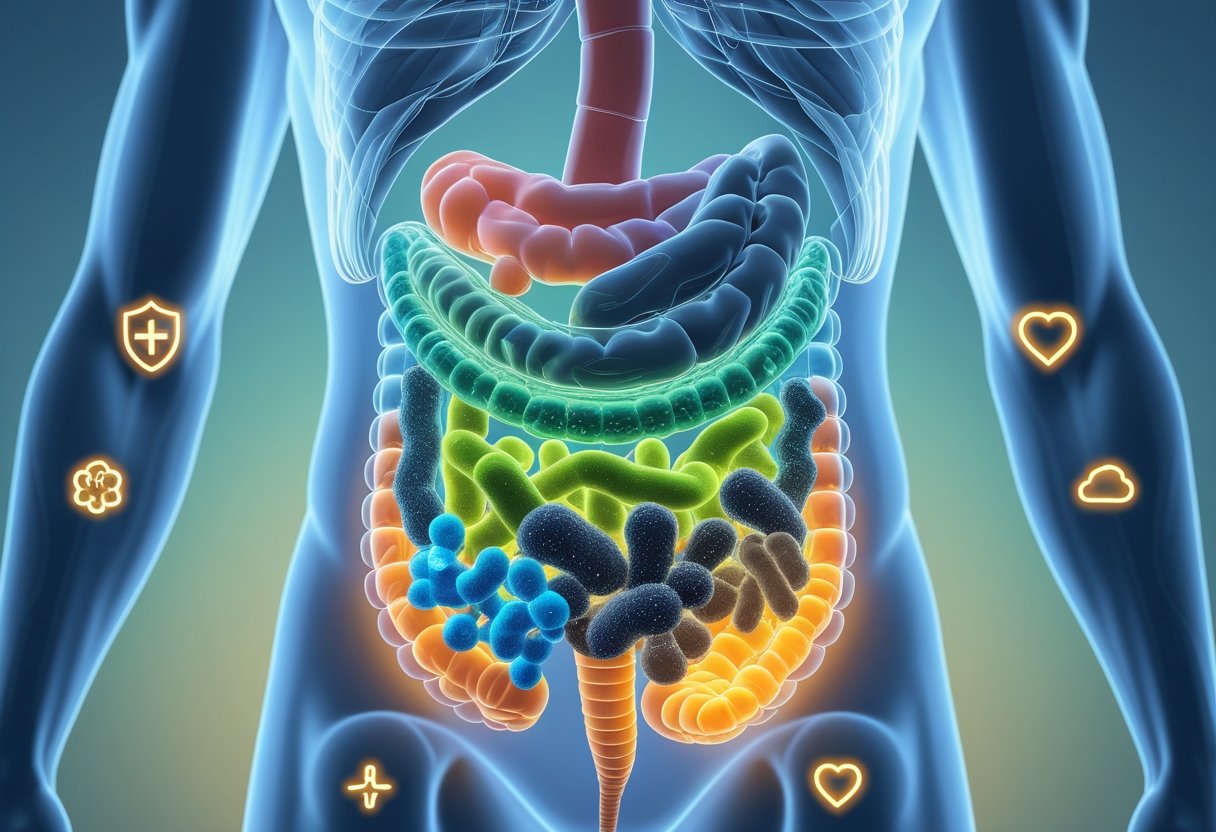
An unhealthy gut microbiome can weaken immune defenses, leaving the body vulnerable to frequent infections and autoimmune conditions. The gut-brain axis also means poor gut health directly affects mood, potentially triggering anxiety, depression, and emotional instability.
Frequent Illness and Weakened Immune Function
About 70% of the immune system lives in the gut. When gut bacteria become imbalanced, immune function suffers dramatically.
People with unhealthy gut microbiomes get sick more often. They catch colds and flu repeatedly throughout the year. Recovery takes longer than normal.
Common signs of weakened immune function include:
- Getting sick 4+ times per year
- Slow wound healing
- Persistent fatigue after illness
- Recurring infections
An imbalanced gut microbiome can contribute to systemic inflammation[7] and autoimmune disorders. Conditions like Hashimoto’s thyroiditis and multiple sclerosis may develop when immune cells attack healthy tissues.
The gut barrier becomes permeable in dysbiosis. Harmful bacteria and toxins leak into the bloodstream. This triggers chronic inflammation throughout the body.
Beneficial bacteria normally train immune cells to respond appropriately. Without this training, the immune system overreacts or fails to protect against real threats.
Mood Swings, Anxiety, and Depression
The gut-brain connection means digestive health directly impacts mental health. An unhealthy microbiome can cause significant mood problems.
Gut bacteria produce about 90% of the body’s serotonin. This neurotransmitter regulates mood, sleep, and appetite. When beneficial bacteria decline, serotonin production drops.
Mental health symptoms of gut imbalance:
- Sudden mood swings
- Persistent anxiety
- Brain fog and poor concentration
- Irritability without clear cause
The gut bacteria and their products affect appetite[8] and mood through neurotransmitter release. Harmful bacteria can produce toxins that interfere with normal brain function.
Depression often accompanies digestive disorders. Several studies show differences in gut microbiota composition[8] between people with major depressive disorder and healthy individuals.
The gut-brain axis works both ways. Stress and negative emotions can worsen gut health. This creates a cycle where poor gut health worsens mood, which further damages the microbiome.
Food Intolerances and Sensitivities
Developing new food intolerances often signals an unhealthy gut microbiome. The gut lining becomes damaged and cannot properly process certain foods.
Leaky gut syndrome occurs when the intestinal barrier breaks down. Food particles leak through the gut lining into the bloodstream. The immune system treats these particles as foreign invaders.
Common food sensitivity symptoms:
- Bloating after eating specific foods
- Digestive discomfort with dairy or gluten
- Skin reactions to certain ingredients
- Fatigue after meals
Nutrient absorption becomes impaired when the gut lining is damaged. Even healthy foods may cause problems because the body cannot process them correctly.
Food intolerances can develop suddenly, even to foods previously eaten without issues. This happens when beneficial bacteria that help digest these foods disappear from the microbiome.
The immune system becomes hyperactive in response to leaked food particles. This can trigger inflammation throughout the body, not just in the digestive system.
Major Causes of Gut Microbiome Imbalance
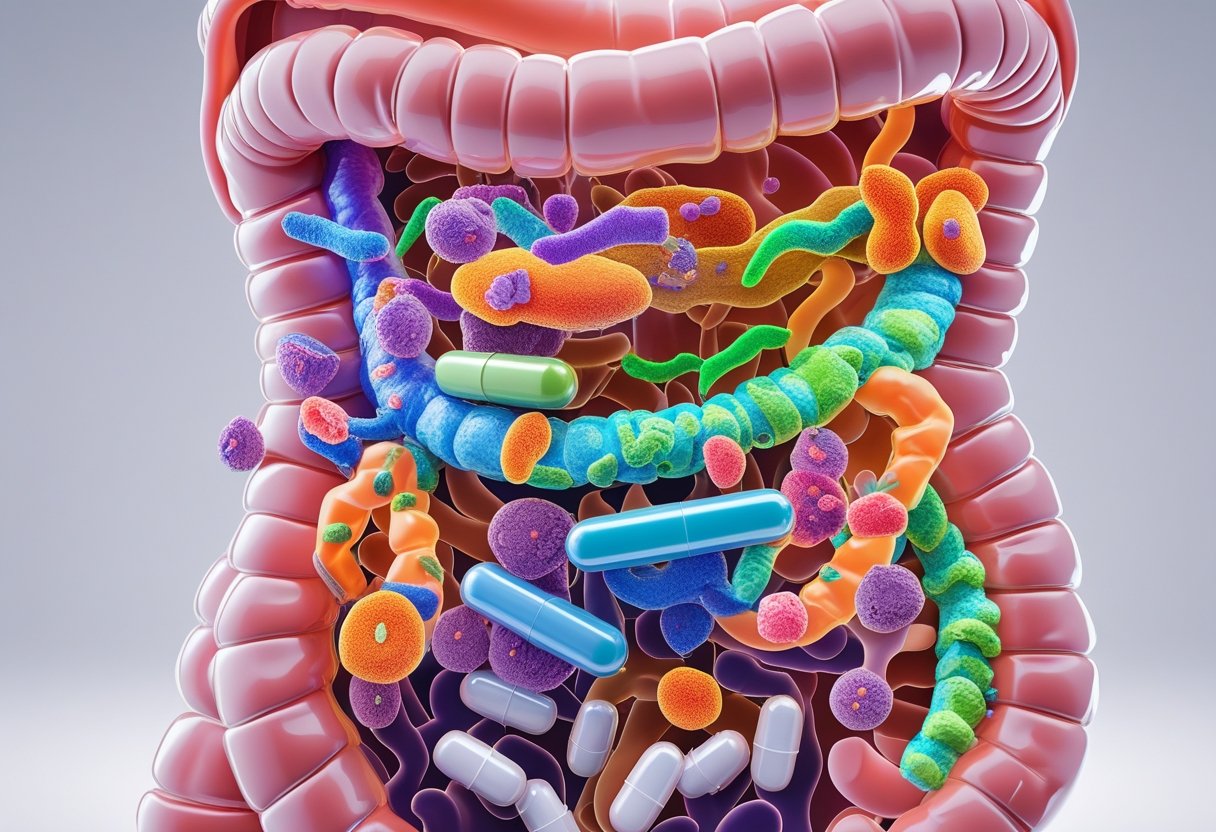
Several factors can disrupt the delicate balance of bacteria in your digestive system, leading to dysbiosis. Modern lifestyle choices like eating processed foods, taking antibiotics, and dealing with chronic stress are the main culprits behind gut microbiome problems.
Dietary Triggers and Processed Foods
Processed foods are one of the biggest threats to gut health. These foods contain artificial additives, preservatives, and chemicals that harmful bacteria love to feed on.
Refined sugar acts like fuel for bad bacteria in the gut. When people eat too much sugar, it feeds pathogenic microorganisms and helps them multiply quickly.
The worst dietary offenders include:
- Ultra-processed snacks (chips, cookies, crackers)
- Sugary drinks and sodas
- Fast food high in trans fats
- Artificial sweeteners like aspartame
Alcohol consumption also damages the gut lining and reduces beneficial bacteria diversity. Even moderate drinking can shift the microbiome balance toward harmful species.
Diets low in fiber deprive good bacteria of their main food source. Without enough plant foods, beneficial microbes cannot thrive and maintain a healthy gut environment.
Effects of Antibiotics and Other Medications
Antibiotics can wipe out both good and bad bacteria in the gut. While they kill harmful infections, they also destroy beneficial microbes that take months to fully recover.
A single course of antibiotics can reduce gut bacteria diversity by up to 30%. Some people never fully restore their original microbiome composition after antibiotic treatment.
Other medications that disrupt gut balance include:
- Proton pump inhibitors (acid reflux medications)
- Non-steroidal anti-inflammatory drugs (NSAIDs)
- Birth control pills
- Certain antidepressants
People who take multiple medications face higher risks of developing dysbiosis and gut microbiome imbalance[9]. The combination of drugs can create a perfect storm for harmful bacteria overgrowth.
Stress and Sleep Deprivation
Chronic stress directly impacts gut bacteria through the gut-brain connection. When stress levels stay high, it reduces beneficial bacteria and allows harmful species to take over.
Cortisol, the main stress hormone, damages the intestinal lining and changes the gut environment. High cortisol levels make it harder for good bacteria to survive and multiply.
Poor sleep disrupts the natural rhythm of gut bacteria. People who get less than 7 hours of sleep per night show reduced microbiome diversity and increased inflammation.
Sleep deprivation affects gut health by:
- Reducing beneficial bacteria populations
- Increasing intestinal permeability
- Raising cortisol and stress hormones
- Weakening immune system function
Stress from work, relationships, or major life changes can trigger digestive problems within days. The gut microbiome responds quickly to psychological stress, making stress management crucial for gut health.
How to Restore and Maintain a Healthy Gut Microbiome
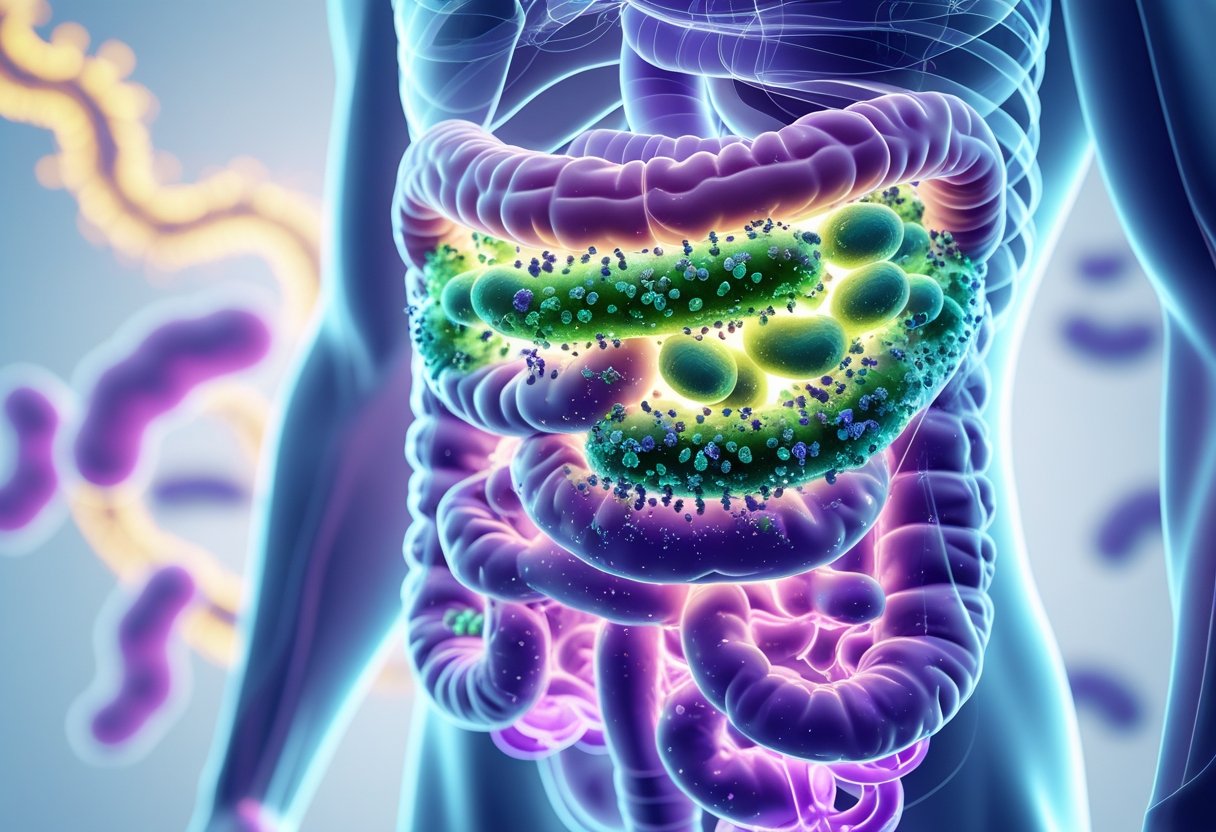
Restoring a balanced gut microbiome requires targeted dietary changes, strategic use of probiotics and prebiotics, consistent lifestyle modifications, and supportive supplements. These evidence-based approaches work together to rebuild beneficial bacteria populations and create an environment where healthy digestion can thrive.
Dietary Strategies for Gut Health
A nutrient-rich diet forms the foundation of gut restoration. Fiber-rich foods serve as fuel for beneficial bacteria, helping them multiply and crowd out harmful microbes.
Key Foods for Gut Restoration:
- Leafy greens: Spinach, kale, and arugula provide essential fiber
- Berries: Blueberries and raspberries contain antioxidants that reduce gut inflammation
- Nuts and seeds: Almonds, walnuts, and chia seeds offer healthy fats and fiber
- Whole grains: Oats, quinoa, and brown rice support diverse bacterial growth
Olive oil provides anti-inflammatory compounds that help heal the gut lining. Adding more fiber to the diet[10] increases microbial diversity and reduces gastrointestinal issues.
People should eliminate processed foods, artificial sweeteners, and excess sugar. These foods feed harmful bacteria and disrupt the microbiome balance.
Eating slowly and chewing thoroughly improves digestion. This simple practice reduces bloating and helps the gut process nutrients more effectively.
The Importance of Probiotics and Prebiotics
Probiotics introduce beneficial bacteria directly into the gut. Prebiotics feed existing good bacteria, helping them flourish and maintain dominance over harmful microbes.
Top Probiotic Sources:
- Fermented foods: Kimchi, sauerkraut, and miso provide live beneficial bacteria
- Yogurt: Choose unsweetened varieties with active cultures
- Kefir: Contains more bacterial strains than yogurt
- Kombucha: Fermented tea that supports gut diversity
Prebiotics work as fertilizer for good bacteria. Garlic, onions, asparagus, and bananas contain prebiotic fibers that beneficial bacteria consume.
Probiotic supplements can fill gaps when fermented food intake is limited. Look for supplements containing multiple bacterial strains and high CFU counts.
The combination of probiotics and prebiotics creates a synbiotic effect. This pairing maximizes bacterial colonization and gut health benefits.
Lifestyle Changes: Exercise, Stress Management, and Sleep
Regular exercise increases blood flow to the digestive system and promotes bacterial diversity. Physical activity helps beneficial bacteria thrive while reducing inflammation throughout the body.
Effective Exercise Types:
- Walking for 30 minutes daily
- Yoga poses that massage the digestive organs
- Swimming for low-impact cardiovascular benefits
- Strength training to reduce systemic inflammation
Chronic stress disrupts the gut-brain connection and allows harmful bacteria to proliferate. Meditation practices help regulate stress hormones that negatively impact gut health.
Sleep quality directly affects microbiome balance. Poor sleep patterns disrupt bacterial rhythms and weaken the intestinal barrier.
Adults need 7-9 hours of consistent sleep nightly. This allows the gut lining to repair and beneficial bacteria to maintain their protective functions.
Supplements and Supportive Foods
Targeted supplements can accelerate gut healing when combined with dietary changes. Digestive enzymes help break down food particles that might otherwise feed harmful bacteria.
Beneficial Supplements:
- Digestive enzymes: Support proper food breakdown
- Collagen: Helps repair the gut lining
- L-glutamine: Amino acid that heals intestinal walls
- Omega-3 fatty acids: Reduce gut inflammation
Bone broth provides collagen and minerals that support gut barrier function. The gelatin in bone broth helps seal gaps in the intestinal lining.
These supplements work best alongside dietary improvements. They cannot replace the benefits of fiber-rich foods and fermented foods but can enhance the healing process.
Some people may need specific supplements to regulate blood sugar and reduce sugar cravings. Chromium and berberine help stabilize glucose levels that affect gut bacteria balance.
Frequently Asked Questions
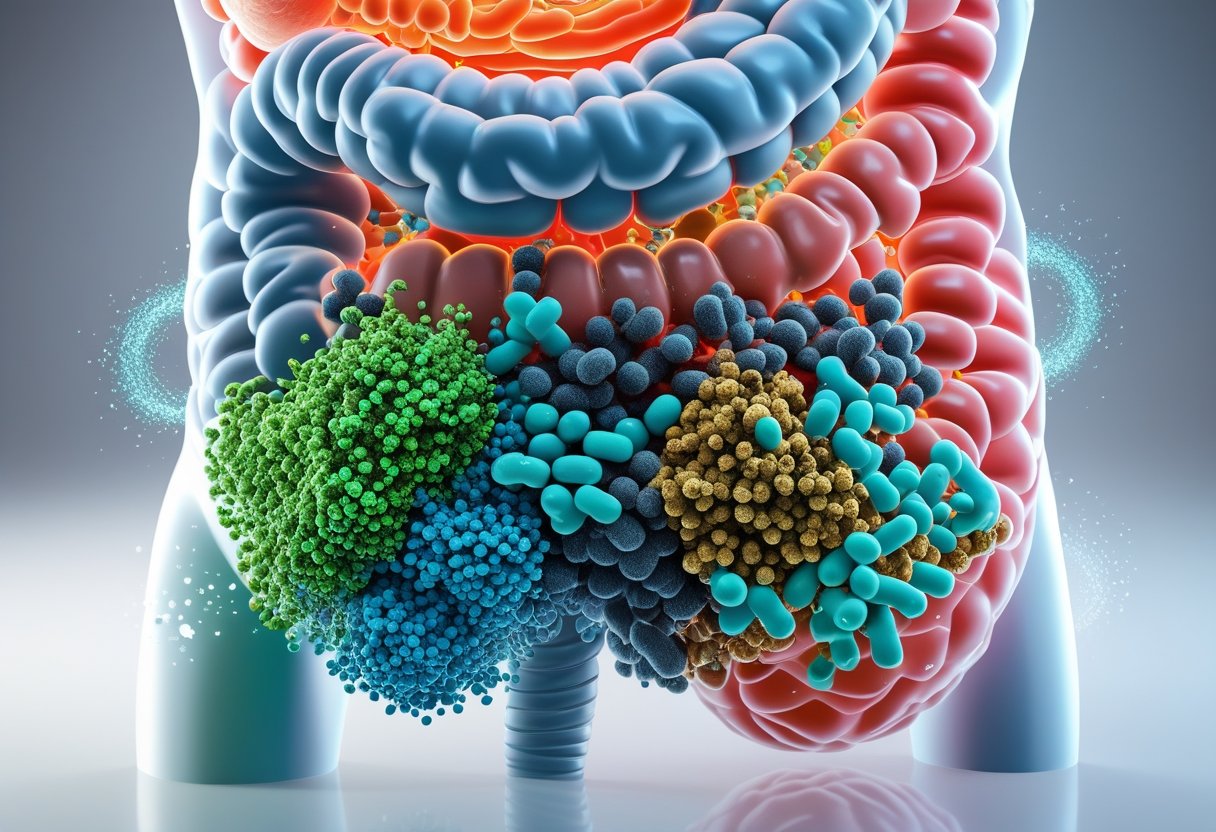
Many people experience digestive symptoms, skin problems, and mood changes without realizing these issues stem from gut bacteria imbalances. Understanding specific warning signs and proven restoration methods helps identify problems early and implement effective solutions.
What are common symptoms of a compromised gut microbiome?
Poor digestion manifests as gas, bloating, and heartburn[3]. These symptoms indicate the gut struggles to break down food properly.
Changes in bowel habits include constipation, diarrhea, or irregular movements[3]. Healthy stools should be soft but formed and easy to pass.
Skin conditions like eczema, psoriasis, and rosacea often develop[3]. Imbalanced gut bacteria trigger immune reactions that affect skin health.
Food allergies and sensitivities increase when gut bacteria becomes disrupted[3]. The digestive system cannot process certain foods properly.
Frequent illness occurs because dysbiosis weakens immune function[3]. People catch colds and flu more often when harmful bacteria outnumber beneficial ones.
How can I tell if my gut microbiome is beginning to improve?
Regular bowel movements become more consistent and comfortable. Stools develop better form and require less straining to pass.
Digestive symptoms like bloating, gas, and heartburn decrease in frequency and intensity. The stomach feels more settled after meals.
Energy levels increase as nutrient absorption improves. Better digestion allows the body to extract more vitamins and minerals from food.
Skin conditions show gradual improvement with fewer flare-ups. Inflammation decreases as gut bacteria balance restores.
Sleep quality improves as serotonin production normalizes in the gut. Mood stability increases alongside better rest patterns.
What dietary changes can help inhibit harmful gut bacteria?
Reducing added sugar intake prevents harmful bacteria from thriving[3]. Sugar feeds bad bacteria and promotes their overgrowth.
Limiting ultra-processed foods helps restore healthy gut bacteria[3]. These foods contain additives that disrupt the microbiome balance.
Reducing alcohol consumption decreases harmful bacteria populations[3]. Alcohol promotes the growth of disease-causing microorganisms.
Eliminating artificial sweeteners helps beneficial bacteria flourish. These chemicals can kill good bacteria while sparing harmful ones.
Reducing red meat intake decreases inflammation-causing compounds. Plant-based proteins support healthier bacterial diversity.
What are the best natural methods to enhance gut health?
Eating fermented foods like kimchi, kombucha, and sauerkraut provides natural probiotics[3]. These beneficial bacteria help restore microbiome balance.
Consuming high-fiber foods feeds good bacteria[3]. Fruits, vegetables, beans, and nuts provide prebiotics that beneficial bacteria need.
Regular exercise increases good bacteria populations in the gut[3]. Physical activity promotes healthy bacterial diversity.
Managing stress levels protects gut health[3]. Chronic stress disrupts gut motility and increases inflammation.
Prioritizing quality sleep supports microbiome balance[3]. Poor sleep patterns disrupt beneficial bacteria growth.
What are typical indicators of gut flora imbalance?
Unexplained weight changes occur when gut bacteria cannot regulate metabolism properly[3]. The body struggles to absorb nutrients and store fat correctly.
Mood issues and sleep problems develop as serotonin production decreases[3]. The gut produces 95% of the body’s serotonin.
Food cravings intensify as harmful bacteria influence hunger hormones[3]. Bad bacteria can trigger cravings for sugar and processed foods.
Autoimmune conditions may develop when gut bacteria disrupts immune function[3]. The gut plays a crucial role in teaching immune cells proper responses.
Brain fog and difficulty concentrating increase as gut-brain communication becomes impaired. Mental clarity depends on healthy gut bacteria.
What are effective treatments for restoring balance to gut bacteria?
Eating a variety of whole, minimally processed foods supports bacterial diversity[3]. Different plant foods feed different beneficial bacteria strains.
Probiotic supplements can help restore beneficial bacteria populations. Choose supplements with multiple strains and high colony counts.
Prebiotic supplements feed existing good bacteria in the gut. These fiber compounds help beneficial bacteria multiply and thrive.
Staying hydrated helps balance the gut microbiome[3]. Adequate water intake prevents constipation and supports bacterial health.
[Using antibiotics only when necessary prevents unnecessary disruption](https://www.goodrx.com/well-being/gut-health/signs-of-unhealthy-gut[3]
References
- Top 10 Signs of Gut Microbiome Imbalance and How to Fix It. https://www.bione.in/blog/signs-of-gut-microbiome-imbalance/ Accessed November 13, 2025
- How to Reset Your Gut Microbiome: 16 Signs, 14 Tips, and 11 Foods. https://gutvita.com/blog/how-to-reset-your-gut-microbiome-16-signs-14-tips-and-11-foods/ Accessed November 13, 2025
- Access to this page has been denied. https://www.goodrx.com/well-being/gut-health/signs-of-unhealthy-gut Accessed November 13, 2025
- digestive symptoms. https://www.verywellhealth.com/signs-of-an-unhealthy-gut-11720565 Accessed November 13, 2025
- 17 Signs Your Gut Microbiome is Unhealthy. https://heathertickmd.com/17-signs-your-gut-microbiome-is-unhealthy/ Accessed November 13, 2025
- Signs Your Gut Is Unhealthy and the 4 Ways to Restore It. https://www.cnet.com/health/medical/is-your-gut-in-trouble-5-warning-signs-you-shouldnt-ignore/ Accessed November 13, 2025
- Understanding Your Gut Microbiome: The Hidden Universe Within. https://guthealth.org/understanding-your-gut-microbiome-the-hidden-universe-within/ Accessed November 13, 2025
- Stress, depression, diet, and the gut microbiota: human–bacteria interactions at the core of psychoneuroimmunology and nutrition. https://pmc.ncbi.nlm.nih.gov/articles/PMC7213601/ Accessed November 13, 2025
- Dysbiosis: What It Is, Symptoms, Causes, Treatment & Diet. https://my.clevelandclinic.org/health/diseases/dysbiosis Accessed November 13, 2025
- 5 simple ways to improve gut health. https://www.health.harvard.edu/staying-healthy/5-simple-ways-to-improve-gut-health Accessed November 13, 2025
